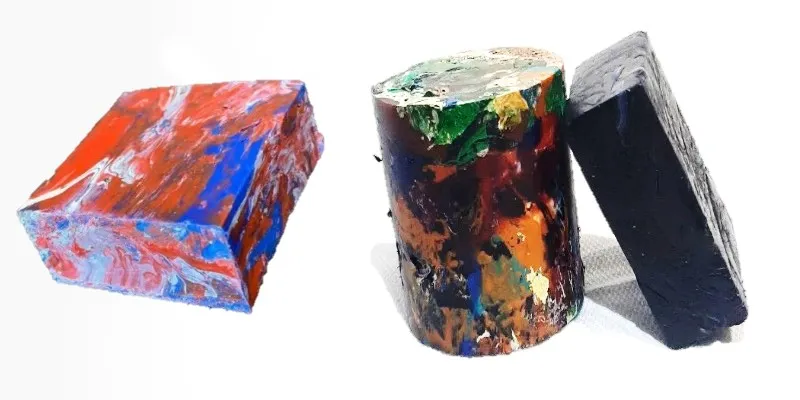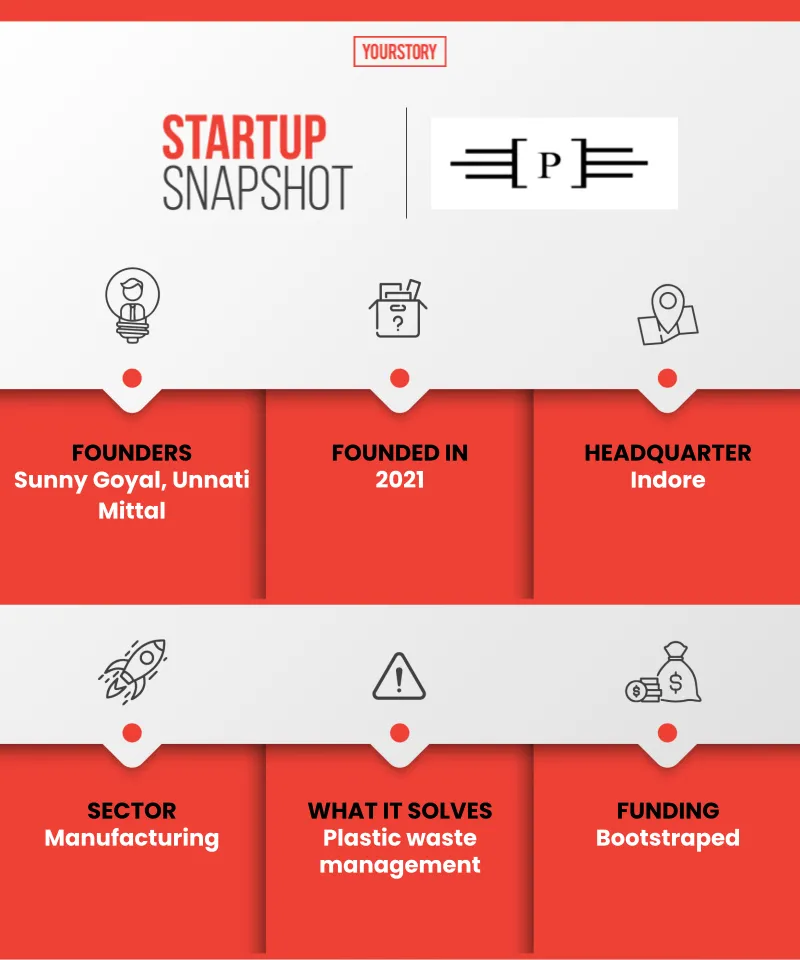[Startup Bharat] These students from Indore are building low-cost trendy furniture using plastic waste
Indore-based startup Plament hopes to reduce the environmental impact of plastic waste by producing eco-friendly, attractive, and useful products from it.
Plastic is well-known for posing significant environmental and health risks and yet we cannot seem to stop using it. According to a report by Central Pollution Control Board (CPCB), India generates over 3.3 million metric tonnes of plastic waste each year.
But two students of Narsee Monjee Institute of Management Studies (NMIMS) — Sunny Goyal and Unnati Mittal — have decided to reduce the impact of hazardous plastic. Earlier this year, the duo started , a company that develops material from plastic waste that can be used to build furniture and items for interior decoration.
Indore-based Plament was launched as a low-cost entrepreneurship endeavour aimed at eradicating plastic waste by producing eco-friendly, attractive, and useful products from it. The name Plament is a combination of the words plastic and management.
Plament has basically developed a new material, which could be used in cost-effective and quality-led furniture and interior products. It is 100 percent recycled and made out of discarded plastic.
“This is environmentally friendly throughout because even if the product gets incapable and/or fractured, the material can be used to produce a new product again. Therefore, it is a constant recycling process,” says Co-founder Sunny.
Plament also lets its buyers exchange damaged items for new products, and claims to have already generated a pipeline of sales with schools and furniture makers.
The inception
It was during a camping trip to the Amarkantak Hills in Madhya Pradesh just before the pandemic, where Sunny and Unnati realised that all the food shops were serving them in plastic packaging.
“This packaging was only of one-time use and most tourists were throwing it away and polluting the surroundings. We saw animals eating the leftovers and consuming the plastic packaging,” recalls Sunny.
They also found out that the locals burnt the plastic and polyethylene along with wood during winters for heat, further polluting the environment and producing harmful gas emissions.
“Unnati and I then decided to do something to fix this problem and we arrived at the concept of Plament,” says Sunny.
Before zeroing on the concept of Plament, the duo started thinking of everything that can be done with plastic waste and stumbled upon the idea of reusing it as a new material to make designer furniture.
“We developed the first prototype at our campus, NMIMS Indore. Our mentor and faculty, Dr Rajarshi Sarkar helped us with the required permission to use the chemistry lab. Within a few months of testing and trials, we developed the material from plastic,” tells Unnati.
The prototype is made of single-use plastic or low-density polyethylene.
“We have done different tests on the prototype to understand its properties like the resistance test (water and heat), strength test, and durability test. Products are beautifully textured, feels like marble, and available in different textures and colours. The base of the products is stainless steel or wood, which give them weight and support. The raw material or plastic waste needed to make an 18 KG product needs 30-32 KG of plastic,” explains Sunny.

Plament's material made out of plastic
Business and competition
Plament is primarily focusing on furniture and interior products and the founders say the material’s low-cost will, in turn, help build products that aren’t as pricey.
“Wooden furniture is costly, and harm the environment by deforestation. On the other hand, we have been able to create a standard size table of of 180cmX120cm breadth and width, which is selling at Rs 2,000 per unit,” he adds.
Unnati says Plament currently does not have direct competition in the market. “As we are creating using a new material, we can look at existing product lines across wood, marble, plain plastic, etc. Nilkamal is one of the biggest players in the plastic material furniture market,” she adds.
Sunny says Indore as a base suits the company as the city’s municipal corporation has extended its hand to help the duo with the raw material — plastic waste.

Plament claims to have sold its product to furniture makers in Indore, and has a pipeline of a profit of Rs 12 lakh for FY 2021-22.
“We have been able to make and deliver 25 paperweights for a renowned university and also supplied 30 tables to another organisation,” he adds.
Unnati adds that due to the second wave of COVID-19, manufacturing had to be put on hold. But Plament has received an order for 120 tables from a Blind Children’s School, and plans to execute the same at the earliest.
Funding and future
Plament raised seed money of Rs 3 lakh from the founders’ friends and family to get started. The venture has also been picked by Wadhwani Foundation’s NEN NextGen programme to help kickstart its journey. To scale further, the duo is looking to raise around Rs 15 lakh this year.
The startup wants to set up a manufacturing plant to expand its operations.
“We will be initially focusing on the manufacturing of table furniture with an aim to capture the traditional furniture market by this new offering. Our plan is to target people aged 18-25 and offer them new stylish low-cost furniture for their homes, schools, restaurants, office, etc,” says Sunny.
The pandemic also forced the company into a hiring freeze and Plament is currently managed only by the two founders.
“We plan to hire at least 15 skilled team members who could effectively perform operations immediately after the pandemic situation improves,” adds Sunny.
Edited by Saheli Sen Gupta


![[Startup Bharat] These students from Indore are building low-cost trendy furniture using plastic waste](https://images.yourstory.com/cs/2/70651a302d6d11e9aa979329348d4c3e/finalimg-1621066846248.jpg?mode=crop&crop=faces&ar=2%3A1&format=auto&w=1920&q=75)
![[Startup Bharat] Rourkela-based Greenhive is offering sustainable, plastic-free alternatives for daily use items](https://images.yourstory.com/cs/2/b094ec506da611eab285b7ee8106293d/imageonline-co-logoadded8-1614151869951.jpg?fm=png&auto=format&h=100&w=100&crop=entropy&fit=crop)





